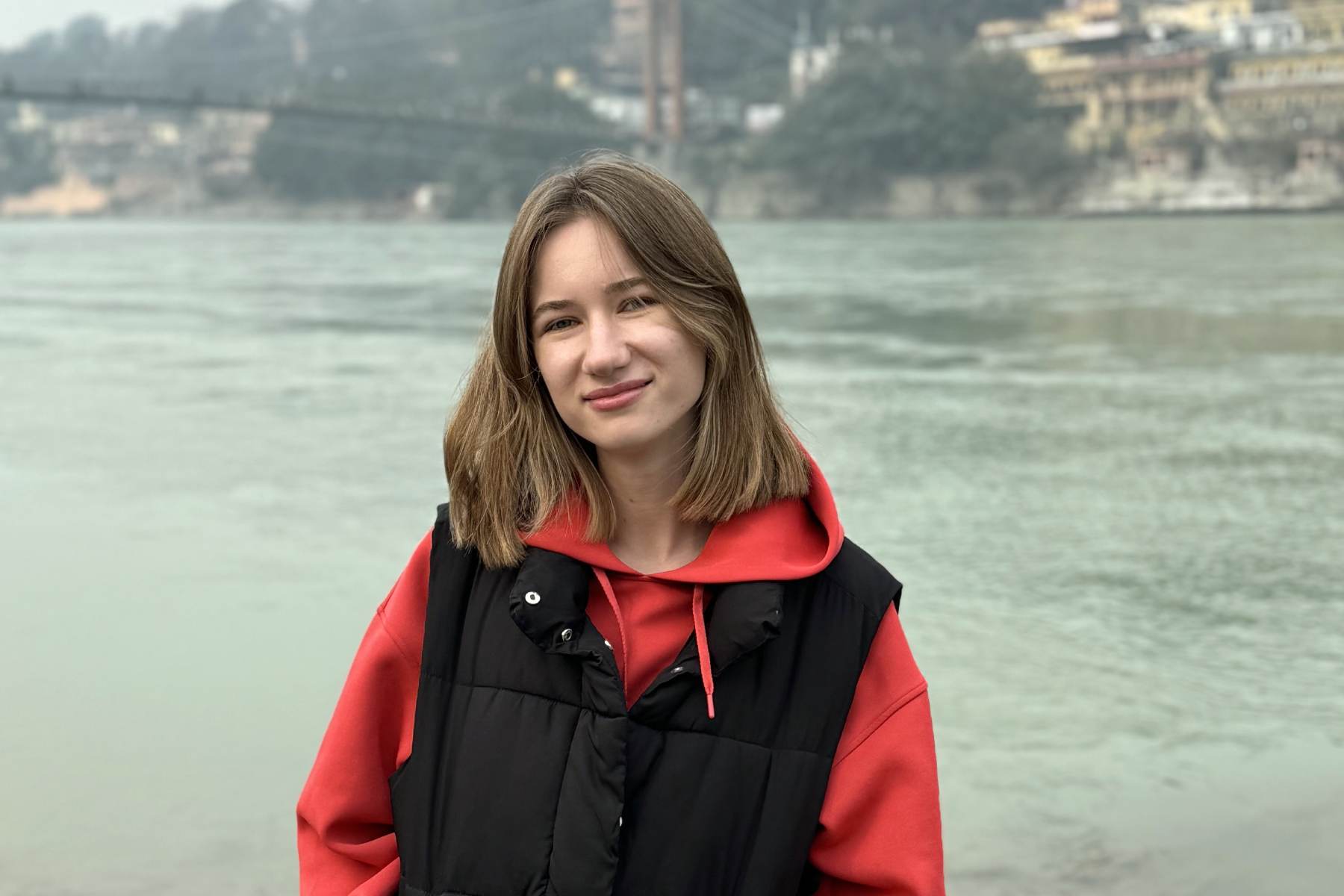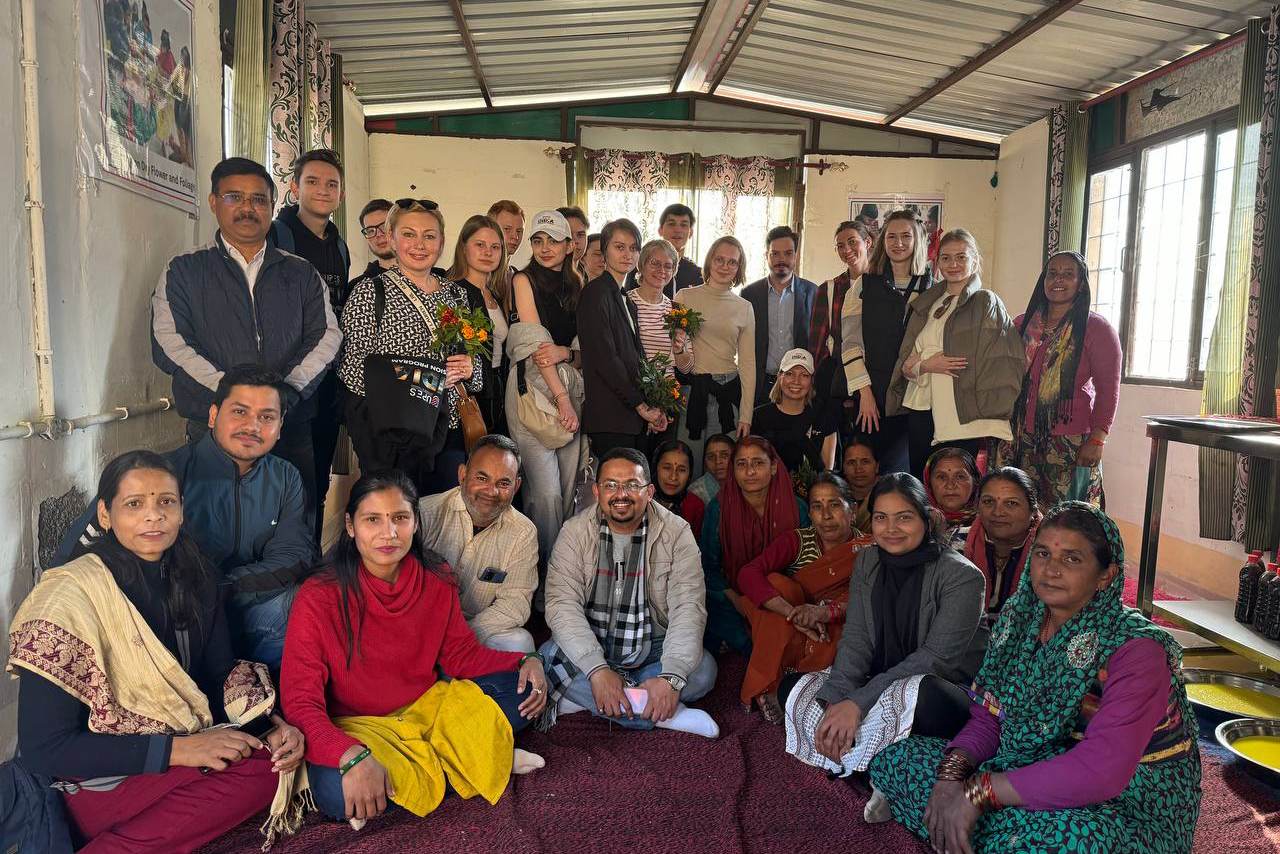‘Anybody Who Does Not Believe in the Importance of Sustainable Development Should Visit India’
In January 2024, HSE students from Moscow, St Petersburg and Nizhny Novgorod took part in the Winter School ‘Business and Governance in India’, hosted in Dehradun by the University of Petroleum and Energy Studies (UPES). Having now completed the course, its attendees—participants of the Master’s in Sustainable Business Management at HSE Graduate School of Business—shared their impressions with the HSE News Service.
Ksenia Kalashnik

I learnt about this Winter School from the Academic Supervisor of our master’s programme, Anna Veselova, and immediately decided to take part in it, although I had never thought about traveling to India before. Since then, I have never regretted my decision; the internship turned out to be very useful both for my general outlook and for exploring a new culture.
The UPES teachers gave amazing lectures, and we learnt a lot about the Indian economy, culture, traditions, philosophy, and religion. Most of all, I remember Dr Anil Prakash Joshi, an eco-activist and the founder of a local NPO called HESCO, the Himalayan Environmental Studies & Conservation Organisation. Dr Joshi told us about climate change and the relationship between humans and nature, as well as the role of civil society and local communities in India.

We also experienced rural life in the Indian villages that HESCO helps. In the master's programme, we talk a lot about the development of local communities and the impact of NPOs on them, how such organisations can be helpful. Here, we could see what they do in practice: they create jobs for women, supply water to villages, support agricultural works (building greenhouses and vegetable gardens), and even install biofuel plants.
The internship included a vast cultural programme. We visited a local festival and learnt some Indian dance moves. In turn, we taught local students some Russian folk dances—they really asked for it. One student from Nizhny Novgorod, Yana, is a professional dancer, so she quickly taught us the simplest elements—I don’t even know their names. We danced to ‘Kalinka’ and did a round dance. Everyone was really excited.
Besides dancing, we played basketball and watched kites fly. We tried the local cuisine and liked it: the tofu with rice was very tasty, although I found it unusual to eat it twice a day for ten days in a row. Life on campus is busy, and India as a whole is a different world. After a trip to this country, you begin to understand yourself better, appreciate life more, and enjoy little things as the locals do.
Inna Pigoleva

A study trip is the best opportunity to get to know a new country, so I was interested in this Winter School in India as soon as I heard about it.
The schedule was intense, but balanced. In the morning, we had lectures and discussions, which helped us develop a comprehensive understanding of India—its economy, political system, business environment, technology, and culture. In the afternoon, we made field trips, got acquainted with sustainable practices used to boost the socio-economic development of India, and also immersed ourselves in Indian culture and life.
I really enjoyed participating in discussions on philosophical and difficult topics (for example, is India a rich or poor country?), as well as learning about real practical cases—what has already been done in the country to improve the quality of life. For example, I was happy to learn about the Aadhaar project (the world's largest biometric system, which already has more than a billion registered users), women’s support programmes, sustainable agriculture practices along the entire value chain, and more.

As we lived on the UPES University campus, we socialised with local students. I won’t forget all our activities: morning yoga, sports (including a friendly basketball match), cultural festivals, dance classes, and even a dance battle (Indian dance versus Russian folk). It was fun. We were delighted by the rich fauna on campus: in the evenings, there are about as many monkeys as there are students, and the trees were full of parrots of the most exotic colours.
Our programme also included two trips to neighbouring cities. Rishikesh is the spiritual capital of India, the birthplace of yoga, a place filled with incredible energy, with ascetic ashrams, colourful markets and mysterious religious ceremonies. The Beatles were inspired to create one of their most famous albums there. Mussoorie is a cosy and tranquil town in the foothills of the Himalayas with breathtaking views of paddy fields and swings into the sky, which we certainly tried out.
I suppose our trip to India helped highlight the sustainable development agenda in today’s reality. India has a lot of strengths, but there are also cities there that lead the world ‘anti-ratings’ for air and water quality, and the country is suffering from an obvious problem with garbage (it is everywhere). Along with that, remnants of the caste system, the vulnerable social status of women, and the unacceptably low standard of living among the majority of the local population still remain relevant. I believe that anyone who does not believe in the importance of sustainable development should visit India at least once and see everything with their own eyes.
Yulia Frolova

In the first module of this academic year, we had a course on sustainable marketing. One professor from India taught it, so at the beginning of each class we practiced meditation. It boosted my strong desire to get back to India, as I had already been there in 2013. After completing that course, we were told about the opportunity to participate in the Winter School at UPES. I had always dreamt of living on a university campus, so all the stars aligned.
We not only lived on campus and studied at university, but also visited NPOs and met local entrepreneurs. For example, we visited the non-profit organisation HESCO and went to a farm where they support female entrepreneurs, helping them produce an environmentally friendly product and establish distribution channels. Overall, our immersion programme gave us a systemic understanding of the economy, culture, and education, and not just the context of the sustainable development agenda in India.

India is a country of contrasts with terrible social inequality, severe poverty, litter-covered streets, and complete chaos on the roads. But at the same time, there are a huge number of new schools and universities; the nation enjoys high spiritual values and effective government initiatives. I have no doubt that in 20–40 years, we will see a completely different country.
Thanks to the organisers and the university for this trip!
See also:
‘Opportunities Always Exist; You Just Need to Find Them’
Kartik Joshi, from India, is pursuing a master's degree at HSE University, specialising in Data Science. In his interview, he talks about his life and studies in Moscow and invites HSE students and staff to participate in the Holi festival on March 21.
HSE Winter School on Analytics and Data Science Brings Together Specialists in Different Fields
In early February, the HSE Cultural Centre hosted ‘IT Session: Immersion in the Data World’, a winter school on analytics and data science organised by the Continuing Education Centre of the Faculty of Computer Science. More than four hundred participants attended lectures by speakers from Yandex, T-Bank, MTS, Okko, Kuper, Avito, Bank of Russia, Beeline, as well as FCS experts. The event gathered both early-career analysts and students, as well as experts seeking to better understand how analytics and data science can be applied in various industries.
‘One Must Possess Knowledge, Skills, and Competencies to Build a Successful Business in Eastern Markets’
HSE University’s Eastern Perspective expert club has held its first event—a business session dedicated to launching and developing successful businesses in India. The club was created by HSE experts to discuss tools, trends, and insights for cooperation between Russia and countries in Southeast Asia, the Middle and Near East, and North Africa. The event featured experts with years of successful experience working in the Indian market on behalf of major global corporations.
‘Land of a Billion Chances’
On January 23, HSE University's Eastern Perspective Expert Club will hold its first event—a business session dedicated to setting up and developing a successful business in India. Leading global experts have described the country as ‘a market of a billion chances.’ Speakers will present five key steps in market research, the three most effective strategies, and the geography of the most promising industries and opportunities.
Building Strong Ties: HSE Expands Horizons of Educational Collaboration with India
Representatives from the HSE Institute of Education have visited leading Indian universities, including the University of Delhi, Jawaharlal Nehru University, and O.P. Jindal Global University, as well as several research centres. HSE staff gave guest lectures on the Russian education system, highlighting its features and opportunities for international students. The visit aimed to strengthen academic collaboration between the two countries.
‘Closing a Deal Gives an Exhilarating Sense of Achievement’
Bhaskar Kayathwal, 26, from India, completed his programme in Master of International Business at HSE University in 2021. Currently, he is responsible for business development at an influencer marketing company. In an interview with the HSE News Service, Bhaskar shares his experience at HSE University, the importance of seizing unexpected opportunities, and the parallels between business development and chess.
HSE University Starts Collaboration with Jawaharlal Nehru University in India
HSE University has signed a memorandum of understanding with India's leading university, Jawaharlal Nehru University (JNU), New Delhi. All HSE campuses will participate in the collaboration. Under the memorandum, the two universities will share teaching experience, conduct joint research, and organise short-term academic and cultural exchange programmes.
HSE University-St Petersburg Hosts 50 Students from Top Indian Universities
HSE University-St Petersburg hosted the Indian Students Week. The event gathered more than 50 students from India. The students represented 15 top universities in the country. In particular, there were representatives of IIT Bombay, IIT Delhi, UPES, IIM Amritsar and others. The goal of this large-scale initiative of HSE University-St Petersburg is to introduce talented students from India to educational opportunities in Russia, in particular, HSE educational programmes in four directions: business and economics, design, social and computer sciences.
'Joint Background in Political Science and Anthropology Turned Out to Be Invaluably Useful in Studying the Region'
From April 26 to May 7, a team of professors and students from HSE University-St Petersburg conducted a field study in the Indian Himalayas. Below, Aleksei Sorbale, academic supervisor of the Bachelor's programme 'Political Science and World Politics', and Pavel Bazarov, a student of the Master's programme 'Global and Regional History', speak about their research and share their impressions of the expedition.
HSE Strengthens Cooperation with India and Creates Opportunities for Dialogue between Experts
Following the visit of the HSE University delegation to New Delhi, cooperation agreements with leading Indian universities were finalised. Similarly, a number of expert events, consultations and negotiations on the development of comprehensive strategic cooperation with Bharat took place. The HSE University delegation also participated in the Raisina Dialogue, one of the largest international expert forums.


